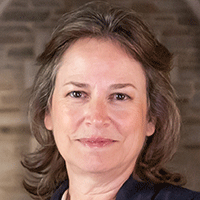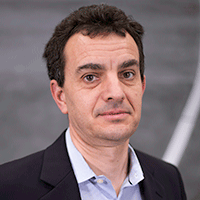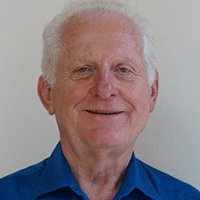Monday, November 16, 11amET

Emily A. Carter, Ph.D.
Executive Vice Chancellor and Provost (EVCP)
Distinguished Professor of Chemical and Biomolecular Engineering
UCLA
Title: "Insights into Sustainable Energy Materials Optimization from First Principles"
Abstract: I believe that scientists and engineers have a responsibility to improve life for all Earth’s inhabitants. To this end, for more than a dozen years, I have used my skills - in developing and applying quantum mechanics methods aimed at complex phenomena difficult to probe experimentally - to accelerate discovery, understanding, and optimization of materials for sustainable energy. These range from materials for converting sunlight and other renewable energy sources to fuels and electricity; to clean, efficient biodiesel combustion; to clean electricity production from solid oxide fuel cells and nuclear fusion reactors; to lightweight metal alloys for fuel-efficient vehicles. During this lecture, I will begin with an overview and then focus on insights into (photo)electrocatalysis that could someday create a virtuous cycle of artificial photosynthesis, exploiting energy from sunlight or other renewable sources, water, air, and carbon dioxide to synthesize the fuels and chemicals needed to sustain future generations.
Biography: Emily A. Carter is the Executive Vice Chancellor and Provost (EVCP), and Distinguished Professor of Chemical and Biomolecular Engineering, at UCLA. Dr. Carter began her independent academic career at UCLA in 1988, rising through the chemistry and biochemistry faculty ranks before moving to Princeton University in 2004, where she spent the next 15 years jointly appointed in mechanical and aerospace engineering and in applied and computational mathematics. During her first stint at UCLA, she helped launch two institutes that still exist today: the Institute for Pure and Applied Mathematics and the California NanoSystems Institute. While at Princeton, she held the Arthur W. Marks ’19 and the Gerhard R. Andlinger Professorships. After an international search, she was selected to be the Founding Director of Princeton’s Andlinger Center for Energy and the Environment. From 2010-2016, she oversaw the construction of its award-winning building and state-of-the-art facilities, the development of novel educational and research programs, and the hiring of its faculty and staff. After a national search, she served from 2016-2019 as Princeton’s Dean of Engineering and Applied Science, where she spearheaded major research, education, outreach, and diversity initiatives, before returning to UCLA as EVCP in September 2019. Dr. Carter maintains a very active research presence, developing and applying quantum mechanical simulation techniques to enable discovery and design of molecules and materials for sustainable energy. Her research is supported by multiple grants from the U.S. Department of Defense and the Department of Energy. The author of over 400 publications, Carter has delivered over 550 invited and plenary lectures worldwide and has served on advisory boards spanning a wide range of disciplines. She is the recipient of numerous honors, including election to the U.S. National Academy of Sciences, the American Academy of Arts and Sciences, U.S. National Academy of Inventors, and the U.S. National Academy of Engineering. Carter earned a B.S. in Chemistry from UC Berkeley in 1982 (graduating Phi Beta Kappa) and a Ph.D. in Chemistry from Caltech in 1987, followed by a brief postdoc at the University of Colorado, Boulder, before joining the UCLA faculty.
Tuesday, November 17, 11:00amET

Dragos Maciuca, Ph.D.
Executive Technical Director
Ford’s Research and Innovation Center
Title: "Opportunities & Challenges for Mechanical Engineering in Autonomy and Artificial Intelligence"
Abstract: When talking about Artificial Intelligence in automotive engineering, the first thought that comes to mind is autonomous vehicles. And indeed, AI has had an incredible impact on autonomous vehicles. In this talk we’ll explore the application of AI for autonomous vehicles together with a brief history of how we got here. However, there are many other applications of AI in automotive engineering and in mechanical engineering, in particular.
This talk will explore the applications of AI in various parts of the industry and some of the challenges and opportunities facing mechanical engineers. We’ll address applications including autonomous vehicles, generative design, robotics and image processing and the role of mechanical engineering in these areas. We’ll also briefly address some of the challenges occurring at the intersection of AI, autonomy and mechanical engineering
Biography: Dragos Maciuca is the Executive Technical Director at Ford's Research and Innovation Center in Palo Alto, California. He is an experienced engineer and management professional, with more than 20 years of professional experience in Silicon Valley spanning a breadth of industries including automotive (BMW and Nissan), consumer electronics (Apple), semiconductor manufacturing (KLA-Tencor) and aerospace (Lockheed Martin). He has extensive experience advising startups, developing and commercializing products, collaborating with universities and leading cross-functional teams. Dragos holds a PhD in Control Systems from University of California at Berkeley and an MBA from the UC Berkeley, Haas School of Business.
Thursday, November 19, 11:00amET

James J. Truchard, Ph.D.
Former CEO, NI
ASME 2020 Richard J. Goldstein Energy Lecture Award Recipient
Title: "A Future for Energy"
Abstract: Humans depend heavily on energy for survival. Humans get energy from the sun via food we eat through nature’s elaborate means of conversion of that food by the electron transport chain into ATP, a form of energy the body’s cells can consume. Humans also have created elaborate means of extracting energy for their use, with carbon being a major source of that energy.
Today Wind and solar are used extensively to generate electricity. The intermittent nature of wind and solar create a demand for storage or an alternate source of energy to close the gap. Batteries are rapidly gaining adoption in vehicles, but see limited use in grid storage.Once nuclear power was seen as a key component of electricity generation. In reality, fission based nuclear power has had only some success while fusion based nuclear power has been fifty years away since the 1950’s. Fission based nuclear power has suffered political acceptance because of safety related fears. The National Academies are currently conducting a study on clean, safe and affordable nuclear power. Using good engineering practices, we can create a sustainable future for energy, perhaps even with nuclear power.
Biography: Dr. James Truchard completed his education at The University of Texas at Austin. He received his bachelor’s and master’s degrees in physics in 1964 and 1967, respectively; and his Ph.D. in electrical engineering in 1974. While pursuing his Ph.D., Dr. Truchard worked full time as a research scientist at the Applied Research Laboratory at UT Austin, where he pioneered technologies for computer-based systems for testing the U.S. Navy’s sonar transducers and sonar beamformers.
Computer-based test measurement systems became Dr. Truchard’s vision for National Instruments, a company he co-founded in 1976. Starting with computer interfaces for traditional instruments, he went on to create data acquisition products interfaced directly to computers. Dr. Truchard co-invented LabVIEW, a graphical programming language that revolutionized how tests and measurements are performed in engineering and science experiments for a wide range of industries. National Instruments went on to create a suite of products and now works with over 35,000 companies and 7,000 universities. On January 1, 2017, Dr. Truchard retired after 40 years as CEO of the company, now known as NI.
Dr. Truchard has actively supported the next generation of engineers through programs such as FIRST® and hands-on learning labs. Since retiring from NI in 2017 he has spent his time sponsoring a number of humanitarian causes, including working with top researchers to help find the cause of Alzheimer’s Disease. Dr. Truchard set-up the Oskar Fischer Prize in 2019 to incentivize Alzheimer’s researchers to take an engineering approach to Alzheimer’s Disease. He believes through out-of-the-box thinking and cross-referencing key factors the answer to this devastating affliction can be achieved. He is also currently sponsoring a study with the National Academies on clean, safe, and affordable nuclear power.
Among his various honors, Dr. Truchard was inducted into the National Academy of Engineering in 2007, named an IEEE Fellow in 2015 and was inducted into the National Inventors Hall of Fame in 2019.